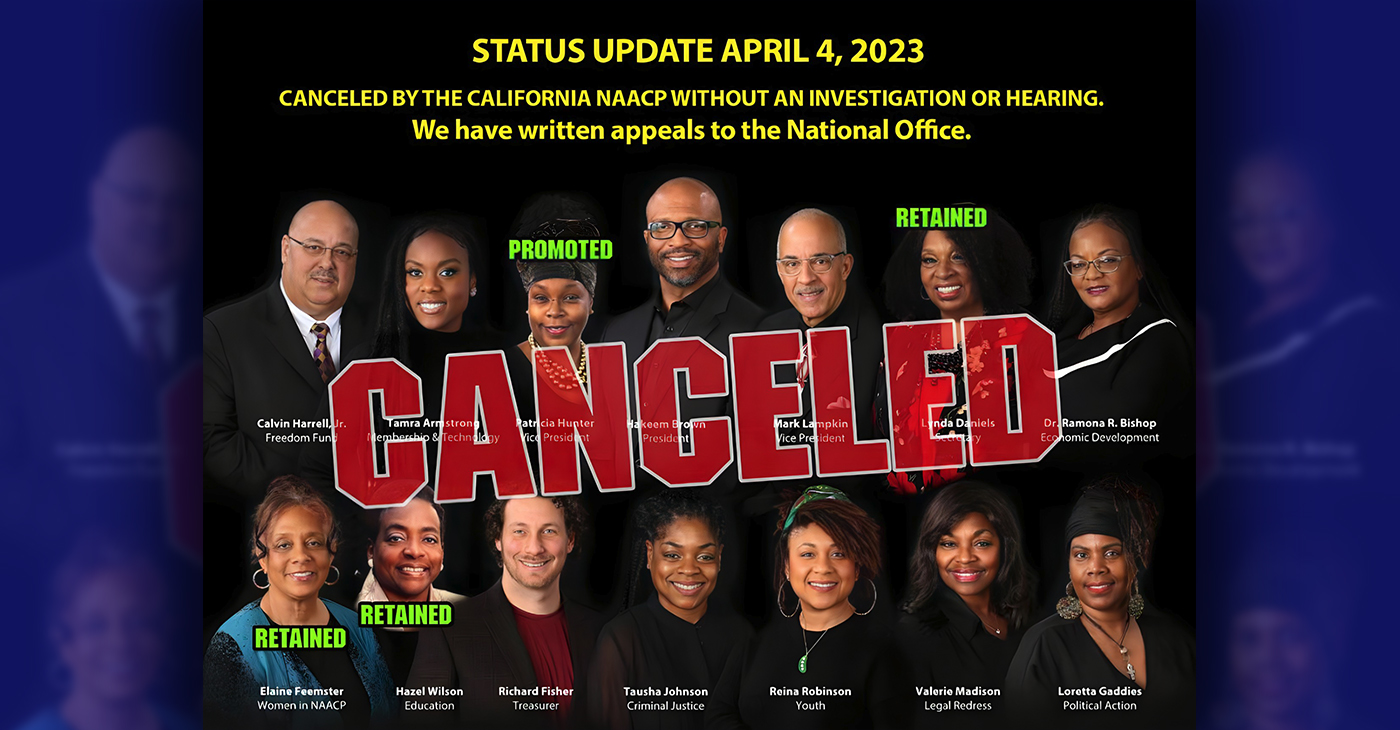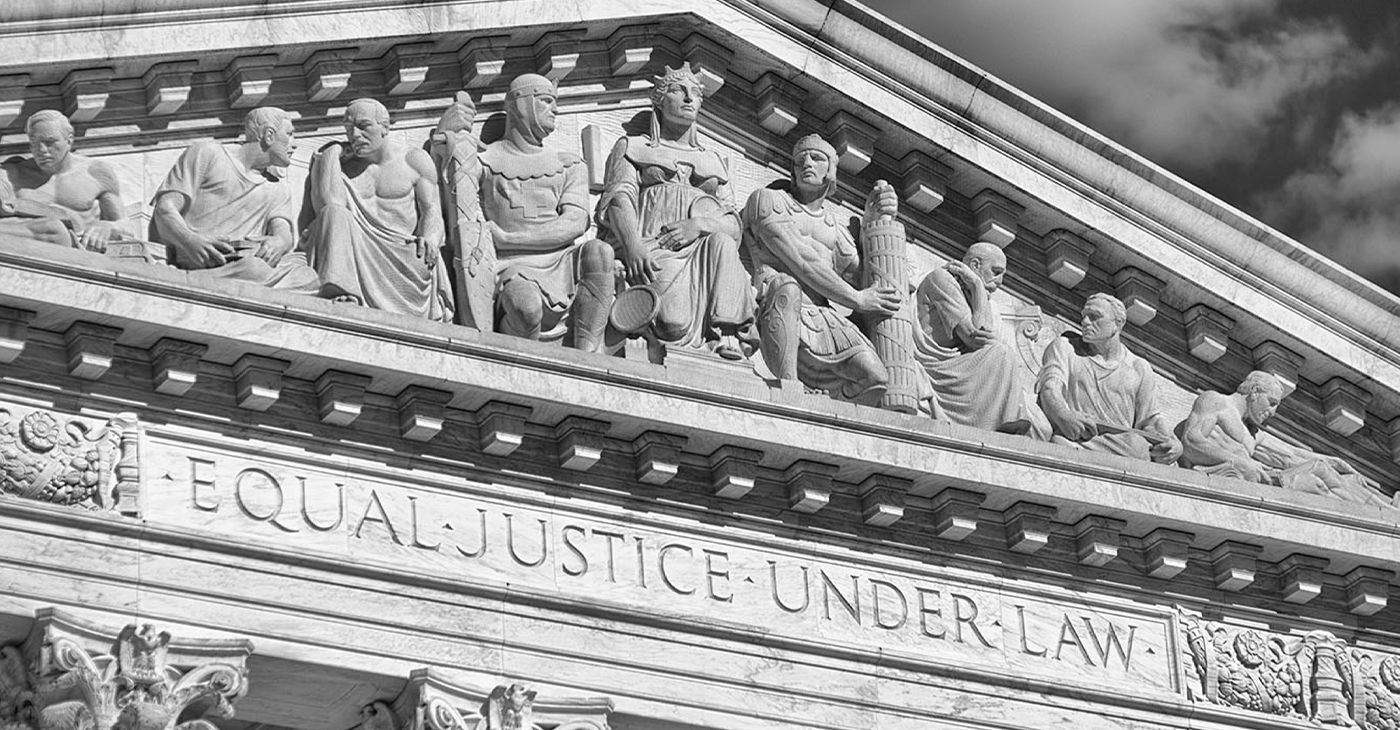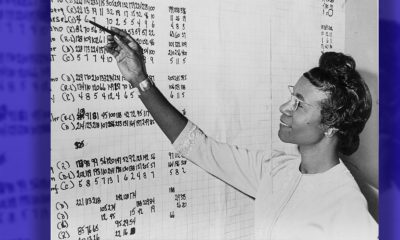Community
Fight Over Vallejo NAACP Presidency Threatens to Tear Org Apart
The Vallejo branch of the NAACP was torn apart this year by the sudden death of its longtime president, Jimmie Jackson, in January. Now, a conflict has arisen over who should take his place. Letters from the organization’s state conference dated March 8 — and lawyers from its national office dated March 15 — demanded that former Vallejo City Council member Hakeem Brown abandon his claims to the position.

Mark Hedin | California Black Media
The Vallejo branch of the NAACP was torn apart this year by the sudden death of its longtime president, Jimmie Jackson, in January.
Now, a conflict has arisen over who should take his place.
Letters from the organization’s state conference dated March 8 — and lawyers from its national office dated March 15 — demanded that former Vallejo City Council member Hakeem Brown abandon his claims to the position.
As Brown tells it, he first worked with Jackson in 2017 to overcome prosecution related to being “the only Black cannabis cultivator in Napa County.” He joined the NAACP branch Jackson had led since 2008 and as the branch’s elections approached late last year, agreed to work as Jackson’s de facto lieutenant.
As Jackson’s health grew worse in January, he named Brown acting president and died unexpectedly a few days later.
Brown and his supporters maintain that Jackson’s endorsement of Brown as his successor was within his rights as president and that Brown’s position was understood and accepted at the branch’s initial meetings this year.
But those letters from the national and state NAACP offices, stated that according to organization bylaws, because Urban Strategies Council site coordinator Patricia Hunter was “duly and properly elected to the position of First Vice President,” she is first in line to take the reins “in the event of the resignation, removal or death” of the incumbent.
When Jackson was re-elected last year, Hunter, Brown and Mark Lampkin won vice-presidential seats.
There is no dispute that Hunter got the most votes of the four candidates and that Brown and Lampkin tied for second, but Brown and his supporters argue that because there was no official ranking of the vice-presidential seats, Jackson was free to later choose any of the three sitting VPs to act in his stead.
“Because there was no numerical ranking on the ballot for the election,” it was within Jackson’s authority to name Brown to fill in for him, Brown, Lampkin and 10 other members of the branch’s Executive Committee asserted in a March 9 “challenge letter” responding to the state conference’s notice.
Citing NAACP bylaws Article 7, section 2, they wrote: “The duties of the Vice President shall be: a) to perform all the duties of the President in his/her absence or disability. In case of more than one Vice President, the Vice Presidents shall be designated as first, second, third and so forth and shall perform their duties according to their numerical rank.”
“Because there was no such designation, we reject the notion that any one person was the 1st Vice President, until such a time as Pat Hunter was elevated by Jimmie Jackson at the same time Hakeem Brown was elevated to the presidency,” the letter reads. “When our election was held, members voted for the Vice-President, not 1st, 2nd, or 3rd Vice-President. Mr. Jackson was of sound mind when he designated Hakeem Brown President.”
Included with that letter are minutes from the branch’s Jan. 11 Executive Committee meeting in which the leadership matter was discussed.
The challenge letter also says that there were no objections to the appointment at the Feb. 8 branch meeting Brown led. Brown told California Black Media (CBM) that he stepped out of that meeting briefly to allow Hunter to oversee a vote on whether to approve his appointment, and that the entire Executive Committee, including Hunter, unanimously ratified him, with only Secretary Lynda Daniels abstaining.
Daniels, who is charged with producing the minutes of branch meetings, has not provided them for that Feb. 8 meeting.
NAACP officers seem to see it differently.
Rick Callender, California/Hawaii NAACP State Conference President, discussing the election in an email addressed to Lampkin, wrote on March 31: “You lost as you were not the top vote getter. You were not duly elected and indeed lost the election.”
The issue under discussion at that time was regaining access to the branch’s Facebook account, stemming from Hunter, who on March 7 lost access to administration privileges to the social media page.
On that page, on March 16, Lampkin, Assistant Secretary Tausha Johnson and Tamra Armstrong each posted video statements from 2 to 5 minutes long alleging a “coup” being staged against Brown by Hunter, Daniels and Hazel Wilson, another Executive Committee member.
Hunter has declined repeated requests from California Black Media to comment on the situation or her work as branch president, initially referring this reporter to Captain David Smith, NAACP California Hawaii Area Director, who deferred to Callender, who refused to comment on the record, saying he had no personal familiarity with any of the players in the drama and is only concerned with following NAACP rules and bylaws.
For questions particular to the branch, he suggested contacting Hunter, who has yet to respond to subsequent phone calls or emails.
Last week, CBM also emailed and called NAACP lawyer Janette Wallace, who signed the March 15 “cease and desist” letter sent to Brown from the organization’s national headquarters.
Neither Wallace nor the other NAACP members who had been cc’d in an emailed version of the letter and were similarly contacted responded to those requests.
At the Dec. 14 branch meeting, Brown called for congratulating Hunter for receiving an award at the 113th NAACP convention held in Boston for 2022 College Division and Youth Advisor.
He attributes the “coup attempt” to people simply being resistant to change, citing an incident when Hunter asked him in December to relax his posture when dealing with Vallejo officials. There are also suggestions that his interest in the branch’s finances may have spurred resistance to his leadership efforts.
Photo screenshot submitted by a member of the local Vallejo NAACP branch Mark Lampkin
(The national NAACP office has not confirmed this ballot)
Activism
Oakland Post: Week of December 18 – 24, 2024
The printed Weekly Edition of the Oakland Post: Week of December 18 – 24, 2024

To enlarge your view of this issue, use the slider, magnifying glass icon or full page icon in the lower right corner of the browser window. ![]()
Activism
City of Oakland Celebrates Reopening of Main Library
“Libraries are such critical facilities for all Oaklanders, whether it’s children coming to story-time, adults reading the newspapers or borrowing the latest novels, and people engaging with a range of services and programs that the library hosts,” said Council President and District 2 Councilmember Nikki Fortunato Bas. “Such library services and programs are only possible when the facility’s electricity, heating, roof, and lighting are fixed and running efficiently. I’m proud to join this re-opening of our Main Public Library.”

The branch had been closed since May for critical infrastructure upgrades
Special to the Post
The City of Oakland leadership and community partners gathered to celebrate the reopening of the Main Library after completion of critical infrastructure upgrades to enhance the library’s facilities and provide a better experience for patrons.
Renovations include new roof installation, skylight repair, critical electrical system upgrades, new boiler control system installation, auditorium heating and cooling system installation, and improvements to lighting, flooring and ceilings throughout the building.
“This is truly something to celebrate, the reopening of our wonderful Main Library! I congratulate the staff and our partners for this important project to make the Main Library a more comfortable place for everyone for years to come, said Oakland Mayor Sheng Thao. “Thank you to Oakland voters and the California State Library for making these crucial improvements possible.”
“Libraries are such critical facilities for all Oaklanders, whether it’s children coming to story-time, adults reading the newspapers or borrowing the latest novels, and people engaging with a range of services and programs that the library hosts,” said Council President and District 2 Councilmember Nikki Fortunato Bas. “Such library services and programs are only possible when the facility’s electricity, heating, roof, and lighting are fixed and running efficiently. I’m proud to join this re-opening of our Main Public Library.”
“Public libraries are a wonderful resource for our residents, offering a safe space for learning and being,” said District 3 Councilmember Carroll Fife. “It is critical to improve and modernize our libraries so more members of our community can utilize and enjoy them. I’m excited that the necessary renovations to the Main Library have been completed successfully and thank everyone involved, particularly the City team, who helped secured the necessary grant funds for this work.”
“I am proud of the City staff and project partners who kept this important project on schedule and under budget,” said Assistant City Administrator G. Harold Duffey. “The library is an incredibly important resource for our community members, and this project is an investment into the library’s future.”
“December 2nd was a momentous occasion for Oakland Public Library as we proudly reopened the doors of the Main Library following extensive infrastructure repairs,” said Director of Library Services Jamie Turbak. “Closing the Main Library for six months was no easy decision, as it serves as the central hub for our library system and is truly the heart of Oakland. Yet, this renovation was essential, representing more than just physical upgrades—it reflects our ongoing commitment to creating a safe, welcoming space for everyone.”
The City Administrator Jestin Johnson also attended the press conference and signalled his support for the completion of the record-setting completion of the renovations. Gay Plair Cobb, a newly appointed Library Commissioner said the Library represents the soul and brains of our community.
The Oakland Public Library secured funding for these crititcal repairs through a variety of sources. The California State Library’s Building Forward Library Facilities Improvement Program awarded the Main Branch $4.2 million. To comply with the grant terms, the City of Oakland provided matching funds through Measures KK, as approved by the Oakland City Council in October 2023.
The Main Library will host an Open House to celebrate the reopening on February 22, 2025, 10 a.m. – 5:00 p.m.
About the Oakland Public Library
The Oakland Public Library is a part of the City of Oakland in California and has been in existence since 1878. Locations include 16 neighborhood branches, a Main Library, a Second Start Adult Literacy Program, the Oakland Tool Lending Library, and the African American Museum and Library at Oakland (AAMLO). The Oakland Public Library empowers all people to explore, connect, and grow. Oaklandlibrary.org
Activism
Biden’s Legacy Secured with Record-Setting Black Judicial Appointments
His record surpasses previous efforts by his predecessors. President Jimmy Carter appointed 37 Black judges, including seven Black women. In stark contrast, Donald Trump’s first term resulted in only two Black women appointed out of 234 lifetime judicial nominations. The White House said Biden’s efforts show a broader commitment to racial equity and justice.

By Stacy M. Brown
WI Senior Writer
President Joe Biden’s commitment to diversifying the federal judiciary has culminated in a historic achievement: appointing 40 Black women to lifetime judgeships, the most of any president in U.S. history.
Biden has appointed 62 Black judges, cementing his presidency as one focused on promoting equity and representation on the federal bench.
His record surpasses previous efforts by his predecessors. President Jimmy Carter appointed 37 Black judges, including seven Black women. In stark contrast, Donald Trump’s first term resulted in only two Black women appointed out of 234 lifetime judicial nominations.
The White House said Biden’s efforts show a broader commitment to racial equity and justice.
Meanwhile, Trump has vowed to dismantle key civil rights protections, including the Justice Department’s Civil Rights Division.
“Having the Black woman’s experience on the federal bench is extremely important because there is a different kind of voice that can come from the Black female from the bench,” Delores Jones-Brown, professor emeritus at John Jay College of Criminal Justice, told reporters.
Lena Zwarensteyn of the Leadership Conference on Civil and Human Rights told reporters that these district court judges are often the first and sometimes the final arbiters in cases affecting healthcare access, education equity, fair hiring practices, and voting rights.
“Those decisions are often the very final decisions because very few cases actually get heard by the U.S. Supreme Court,” Zwarensteyn explained.
Biden’s nomination of Justice Ketanji Brown Jackson to the Supreme Court further reflects his commitment to judicial diversity. Jackson became the first Black woman to serve on the nation’s highest court.
Patrick McNeil, spokesperson for the Leadership Conference, pointed out that over half of Biden’s Black female judicial appointees have backgrounds as civil rights attorneys and public defenders, experience advocates consider essential for a balanced judiciary.
Meanwhile, Congress remains divided over the expansion of federal judgeships. Legislation to add 66 new judgeships—approved unanimously by the Senate in August—stalled in the GOP-controlled House until after the election. House Republicans proposed distributing the new judgeships over the next decade, giving three administrations a say in appointments. President Biden, however, signaled he would veto the bill if it reached his desk.
Rep. Jerry Nadler, D-N.Y., argued the delay was a strategic move to benefit Trump’s potential return to office. “Donald Trump has made clear that he intends to expand the power of the presidency and giving him 25 new judges to appoint gives him one more tool at his disposal,” Nadler said.
-

 Activism4 weeks ago
Activism4 weeks agoOakland Post: Week of November 20 – 26, 2024
-

 California Black Media4 weeks ago
California Black Media4 weeks agoCalifornia to Offer $43.7 Million in Federal Grants to Combat Hate Crimes
-

 Black History4 weeks ago
Black History4 weeks agoEmeline King: A Trailblazer in the Automotive Industry
-

 California Black Media4 weeks ago
California Black Media4 weeks agoCalifornia Department of Aging Offers Free Resources for Family Caregivers in November
-

 California Black Media4 weeks ago
California Black Media4 weeks agoGov. Newsom Goes to Washington to Advocate for California Priorities
-

 Activism4 weeks ago
Activism4 weeks agoOCCUR Hosts “Faith Forward” Conference in Oakland
-

 Activism3 weeks ago
Activism3 weeks agoOakland Post: Week of November 27 – December 3, 2024
-

 Activism4 weeks ago
Activism4 weeks agoRichmond Seniors Still Having a Ball After 25 Years



















































